SOUTHAMPTON, United Kingdom: Rain prevented the scheduled 11:00 am (1000 GMT) local time start of the fifth day’s play in the second Test between England and Pakistan at the Ageas Bowl on Monday — the latest interruption to a fixtures plagued by bad weather.
Only 96.2 overs have been bowled so far in a match that has long appeared destined for a draw, with England 7-1 in reply to Pakistan’s first innings 236.
While the umpires have faced widespread criticism for their strict interpretation of the rules regarding bad light even on a ground where the floodlights have been in use, there was little they could do about an early morning downpour Monday that saturated the outfield at Hampshire’s headquarters.
Pakistan struck with just the fourth ball of England’s reply on Sunday when left-arm quick Shaheen Afridi had Rory Burns caught by Asad Shafiq at second slip for a duck with a fine delivery that swung and seamed.
Dom Sibley (two not out) and Zak Crawley (five not out), recalled in place of Ben Stokes after the all-rounder withdrew to be with his ill father in New Zealand, both struggled against Afridi and the accurate Mohammad Abbas in overcast, bowler-friendly conditions, before the umpires called a halt at 12:00 p.m. (1100 GMT).
Play was finally abandoned for the day at 3:51 pm.
Predictably, the Ageas Bowl was bathed in sunshine minutes after that decision was announced.
Pakistan were indebted to Mohammad Rizwan, who top-scored with 72 and expertly shepherded the tail when it looked like they might be dismissed for under 200.
He was eventually last man out after an innings that spanned four days.
Rizwan batted for three and three-quarter hours, facing 139 balls with seven boundaries during his second fifty in eight career Tests following the 95 he made against Australia in Brisbane in November.
Abid Ali (60) and Babar Azam (47) also battled hard in difficult conditions for batting.
Stuart Broad led England’s attack with 4-56 in 27.2 overs, a return that took the in-form paceman’s tally in four Tests this season to 26 wickets at a miserly average of 12.38.
England lead a three-match series 1-0 after a three-wicket win in the first Test at Old Trafford earlier this month.
The series ends with the third Test, also at Southampton, starting Friday.
Rain causes fresh delay to England-Pakistan second Test
https://arab.news/gcbmw
Rain causes fresh delay to England-Pakistan second Test
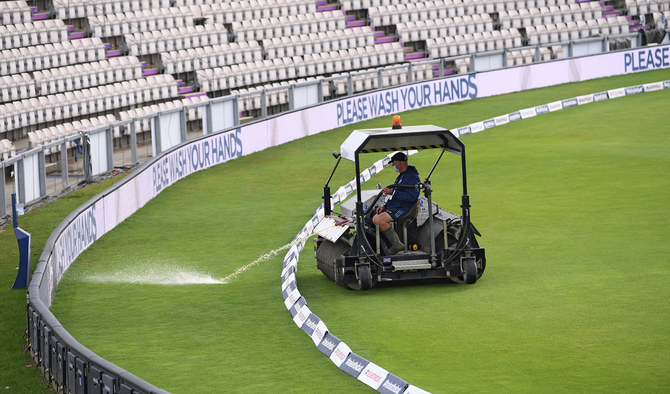
- Only 96.2 overs have been bowled so far in a match that has long appeared destined for a draw
- Umpires have faced widespread criticism for their strict interpretation of the rules regarding bad light
Pakistan to conduct week-long polio vaccination drive in Sindh, KP from Apr. 29
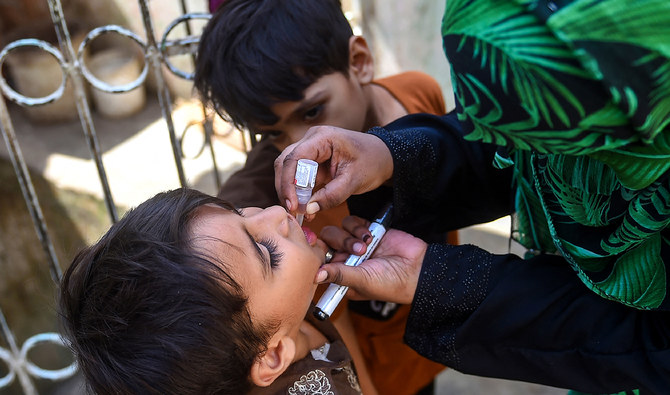
- Campaign to begin in 25 districts of Sindh, 13 districts of Khyber Pakhtunkhwa, says state media
- Eight million children in Sindh, 2.8 million in Khyber Pakhtunkhwa to be vaccinated during campaign
ISLAMABAD: The Pakistani government will conduct a week-long polio immunization program in the country’s northwestern Khyber Pakhtunkhwa and southern Sindh provinces from Apr. 29, the state-run Radio Pakistan reported on Sunday.
Pakistan and Afghanistan are the only two countries in the world where the poliovirus, which causes paralysis and can be a life-threatening disease, is endemic.
“A week-long National Immunization Campaign will begin in twenty-five districts of Sindh and thirteen districts of Khyber Pakhtunkhwa from tomorrow,” Radio Pakistan said in a report.
Chief Minister Sindh Syed Murad Ali Shah chaired a meeting of the Provincial Task Force for Eradication of Polio in Karachi on Saturday. Shah directed all district administrations to cooperate with the polio teams and make the drive successful, the report said.
“The meeting was informed that around eight million children up to the age of five years would be administered anti-polio vaccines during the campaign,” the report said.
Meanwhile, over 2.8 million children will be administered anti-polio drops during the drive, the Khyber Pakhtunkhwa Emergency Operation Center said.
“Twenty-one thousand teams have been constituted for this purpose,” the report added.
Pakistan’s efforts to contain polio have often been met with opposition, especially in the country’s northwestern KP province, where militants have carried out attacks against vaccinators and the security teams guarding them.
Many believe in the conspiracy theory that polio vaccines are part of a plot by Western outsiders to sterilize Pakistan’s population.
Pakistani masses’ doubts regarding polio campaigns were exacerbated in 2011 when the US Central Intelligence Agency set up a fake hepatitis vaccination program to gather intelligence on former Al-Qaeda chief Osama bin Laden.
Six-day ‘Study in Dubai’ fair highlights UAE’s growing appeal to Pakistani students
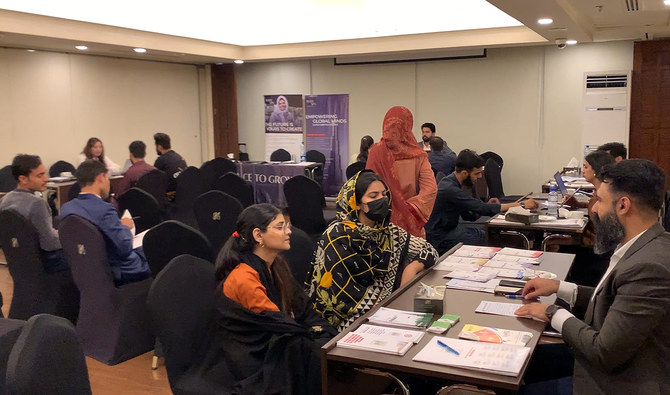
- Foreign student enrollment has increased in Dubai since the launch of its education policy over six years ago
- Educational professionals say Dubai is competing with traditional destinations like the US, UK and Australia
ISLAMABAD: The United Arab Emirates (UAE) has gained traction as a major higher education destination for Pakistani students, university representatives and local admissions professionals noted this week, as the six-day “Study in Dubai” fair concluded in Lahore on Saturday after touring various cities.
Dubai has seen a significant increase in foreign student enrollments since the launch of the UAE National Strategy for Higher Education 2030 more than six years ago. UAE authorities reported this month international enrollments have risen by 25 percent since the 2022-23 academic year, including a seven percent increase among Pakistani students.
Education professionals believe Dubai is increasingly competing with traditional education destinations such as the United States, United Kingdom and Australia.
“What we have observed is that Pakistani students have started moving toward the Emirates,” Muhammad Shoaib told Arab News on Tuesday when the education fair was held in Rawalpindi.
“This is particularly because there have been some policy changes in the mainstream destinations, like Canada, Australia and the UK,” he continued. “Furthermore, we have seen that many reputable universities from the US, UK and Australia have started opening their campuses in Dubai.”
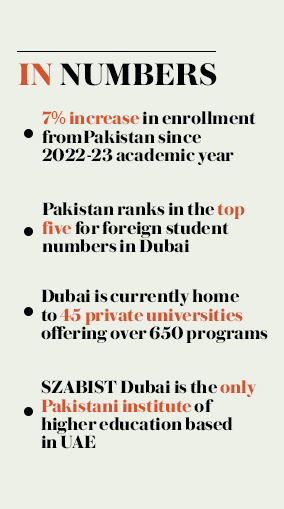
Dubai is currently home to 45 private universities offering over 650 programs, with degrees in business, engineering, information technology and media being the most sought-after among students.
Several top-ranking institutions of learning, including New York University, University of Birmingham, and Australia’s Curtin University, have opened their campuses there in recent years.
Wali-Ur-Rehman, the country manager for Curtin University’s Dubai campus in Pakistan, said the growth in international enrollment was due to increased postgraduate funding and greater job opportunities for those pursuing higher education in Dubai.
“We have seen a massive growth, from 2023 to 2024, of 40 percent [in terms of student applications] in the [Dubai] market, coming from Pakistan especially,” he said.
Daniyal Ahmed, a 19-year-old aspiring candidate for study in Dubai, described the UAE as an “ideal option” for him due to its proximity to Pakistan.
“Dubai has well-known universities now, like New York University and Khalifa University, which are performing quite well,” he said.
Asked about the traditional destinations preferred by students pursuing higher education, he said Pakistanis were beginning to face difficulties in securing visas to go to European universities.
Ahmed also mentioned Dubai’s education strategy, saying it included an expanded professional experience initiative, providing a variety of career training programs to students, such as on-campus work, job shadowing, joint ventures and vocational training.
Pakistan’s PM Sharif to kick off World Economic Forum engagements in Riyadh today
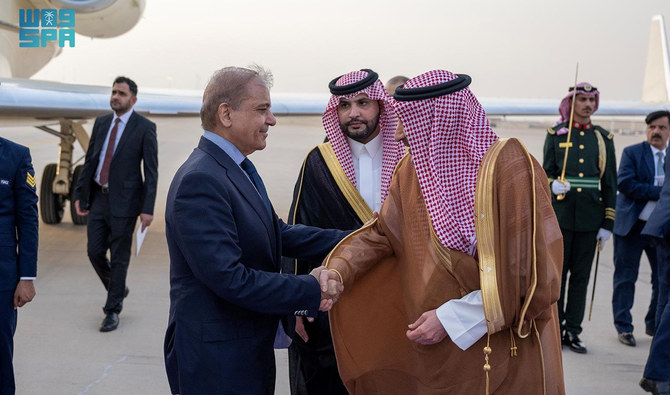
- PM Shehbaz Sharif is in Riyadh to attend two-day World Economic Forum meeting on global growth and energy
- Sharif to meet Saudi leadership, world leaders and heads of international organizations during conference
ISLAMABAD: Prime Minister Shehbaz Sharif and his delegation will kick off their World Economic Forum engagements in Riyadh today, Sunday, as they gear up to present Pakistan’s priorities on key issues such as global health, energy and economic growth, his office said.
Sharif arrived in Riyadh on Saturday to attend a two-day WEF meeting on global collaboration, growth and energy, which will be held in the Saudi capital from April 28-29.
The prime minister was extended an invitation to attend the meeting by Crown Prince Mohammed bin Salman and Professor Klaus Schwab, the WEF executive chairman.
“PM Shehbaz Sharif and his delegation will present Pakistan’s priorities in global health, fintech, climate change, inclusive energy and rejuvenating growth,” the Prime Minister’s Office (PMO) said in a statement on social media platform X.
It added Sharif would meet the Saudi leadership, world leaders, heads of international organizations and prominent figures during his stay in the country.
“Look forward to important discussions on pressing challenges of our times,” the Pakistani prime minister posted from his X account separately on Sunday.
Prior to Sharif’s departure, the PM Office said he would be accompanied by Foreign Minister Ishaq Dar and Finance Minister Muhammad Aurangzeb.
It said Sharif’s participation in the forum will afford Pakistan an opportunity to highlight its priorities in global health architecture, inclusive growth, revitalizing regional collaboration, and the need for striking a balance between promoting growth and energy consumption.
Sharif met Adviser at the Royal Court of Saudi Arabia and General Secretary of Saudi-Pakistan Supreme Coordination Council Mohammed bin Mazyad Al-Tuwaijri on Saturday to discuss economic cooperation between the two countries.
The two sides reviewed the progress on the Saudi investment in Pakistan, which came under discussion during the visit of the Saudi Foreign Minister Prince Faisal bin Farhan recently to Pakistan.
“Al-Tuwaijri and his delegation expressed deep interest in the Saudi investment by the Saudi government and companies in Pakistan,” the state-run APP said.
The prime minister will also attend the 15th session of the Islamic Summit Conference organized by the Organization of Islamic Cooperation (OIC) on May 4-5 in the Gambian capital of Banjul to discuss a variety of regional and global issues, including Palestine, Islamophobia, climate change and the status of minorities, the Pakistani state-run APP news agency reported.
The session will be held under the slogan “Enhancing Unity and Solidarity through Dialogue for Sustainable Development,” according to a press release issued by the OIC General Secretariat.
The Islamic Summit is a principal organ of the OIC focused on the formulation, development, and implementation of decisions made by 57 member states. It is attended by concerned heads of state such as prime ministers, presidents, emirs and other equivalent heads.
Security forces kill one militant, injure another in Pakistan’s southwestern Balochistan
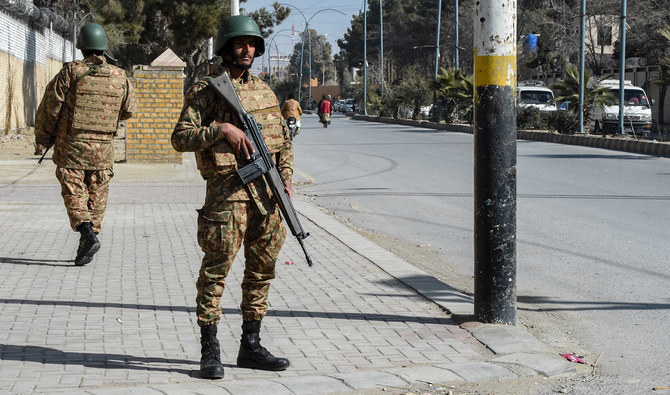
- The operation was carried out while militants were trying to stop passenger vehicles in Harnai district
- Baloch militants killed nine migrant laborers from Punjab in March after stopping a bus in Noshki
ISLAMABAD: Security forces in Pakistan killed one militant and injured another in the country’s southwestern Balochistan province, said the military’s media wing, ISPR, on Saturday, while they were trying to stop passenger vehicles in Harnai district.
Earlier this month, armed assailants intercepted a bus traveling from Quetta to Taftan near the city of Noshki, singling out nine passengers, who were later identified as migrant laborers from Punjab province, and shot them.
Balochistan’s Harnai district has also witnessed militant violence, with an improvised explosive device killing one employee of Mari Petroleum and injuring 14 others in March 30.
“On 27 April 24, a fire exchange took place between security forces and terrorists in Harnai District of Balochistan,” the ISPR said. “The terrorists tried to stop passenger vehicles plying on Sanjavi Road, Harnai. Security Forces reacted immediately and effectively engaged the terrorists.”
The statement mentioned that one militant was killed and another injured during the fire exchange.
“The timely response by the security forces thwarted nefarious intent of the terrorists, saving innocent lives,” the statement added. “Sanitization operation is being carried out to eliminate any terrorists found in the area.”
Balochistan has long been the scene of a low-level insurgency by separatist groups who accuse the state of denying the people of the province of their share in its vast mineral wealth.
The government has frequently denied the allegation, saying it is carrying out a number of development projects for the prosperity of Baloch nationals.
Pakistan says net-metering promotes ‘unhealthy investments’ in solar power
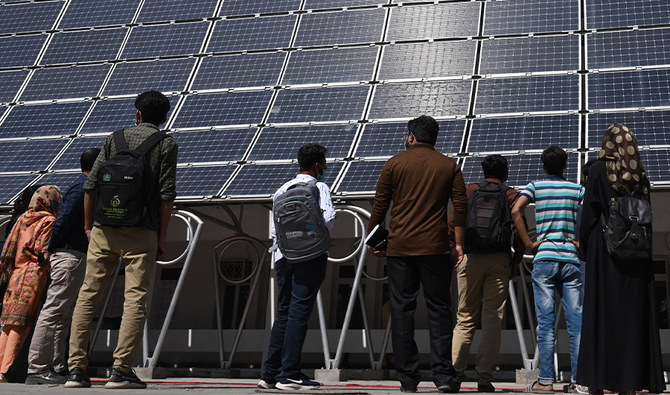
- Government says massive solar installation is affecting 30 million consumers, imposing Rs1.90 per unit burden on them
- Experts say the government’s ‘regressive policies’ will make it difficult to cut fossil fuel and promote renewable energy
ISLAMABAD: The Pakistan government said on Saturday net-metering was promoting unhealthy investments in installation of solar power by affluent domestic and industrial consumers, hinting at cutting the buyback rates to discourage uptick in the sector.
The government approved the net-metering policy in 2017, allowing solar panel purchasers to sell power they produced to the national grid to spur the solar energy use and cut power shortages. Under the policy, the government is paying Rs21 per unit for the net-metered electricity which the government says is resulting in the subsidy of Rs1.90 per unit, burdening the government.
This development comes at a time when the price of solar panels has plummeted by more than 60 percent in Pakistan in recent weeks due to the bulk imports from China because of lower rates, making the country witness a surge in the solar power installation by domestic and industrial consumers to reduce their electricity bills.
“The present system of net-metering is promoting unhealthy investments in solar power,” the energy ministry said in a statement on Saturday. “Affluent consumers have been massively installing solar power due to which domestic, industrial consumers and the government have to bear the burden of Rs 1.90 per unit under the head of subsidy.”
The ministry warned the subsidy was affecting some 25 to 30 million “poor consumers,” and if the trend of the solar power continued, the bills of ordinary consumers would surge by at least Rs 3.35 per unit. However, it clarified no fixed tax was being imposed on the solar power.
The 2017 net-metering policy was aimed at promoting renewable energy in the system, which helped enhance the solarization in the country that now “needs to be balanced,” the ministry said.
Pakistan has ideal climatic conditions for solar power generation, with over nine hours of sunlight in most parts of the country. Utilizing just 0.071 percent of the country’s area for solar photovoltaic (solar PV) power generation would meet Pakistan’s electricity demand, according to the World Bank.
Currently, only 5.4 percent of Pakistan’s installed power generation capacity of 39,772 megawatts comes from renewables like wind, solar and biomass, while fossil fuels still make up 63 percent of the fuel mix, followed by hydropower at 25 percent, according to the National Electric Power Regulatory Authority (NEPRA).
The South Asian nation of 241 million aims to shift to 60 percent renewable energy by 2030 with 50 percent reduction in projected emissions, but it stands far behind in meeting the goal despite a recent surge in the solar power.
Energy experts said the government’s “inconsistent” solar power policies would result in discouraging the sector and its failure in meeting the national and international commitments of cutting the greenhouse gas emissions.
“Public sector the world over is promoting renewable energy to cut fossil fuel while we are discouraging consumers with regressive policies,” Aamir Hussain, chairman of Pakistan Alternative Energy Association, told Arab News.
He said the association had suggested the government to issue licenses to consumers for their actual household or industry load instead of allowing them to install massive solar power with a promise to buyback the surplus.
“The government should come up with an inclusive policy to promote renewable energy instead of discouraging consumers by slapping taxes or cutting the rates,” he added.










